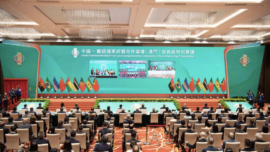The arrival of Uber services has been the cause of many opinions and arguments all around the world, a source for all sorts of individual and collective actions, for or against. It happens with all disrupting technologies. Uber will be for many years the object of case studies about the impact of technology on the way we live and the role of public policy and regulation in fostering or hindering changes. Macau, in that general sense, was not an exception. But the relatively brief presence of the service in the territory has a few twists of its own. On several accounts, the Uber history in Macau will be singular. But let us stick here just to its arrival, how the whole story began. Almost as soon as it rolled onto these shores, the service was declared illegal. As reported by the local media, a joint message by the traffic department and the police declared it so. The joint declaration also threatened those involved with repression and punishment. Strangely enough, such a public document was only published in Chinese no time for translation? Some saw there a whiff of urgency, if not panic, in some less benevolent interpretations. That was already strange enough, but more was to come. The next day, officials retreated a bit: maybe Uber was operating in a gray zone, or the situation was at least less than as straightforward as it might have looked at first which is often the case with new technologies. Then steps in the Chief Executive office and the service is again, in no ambiguous terms, declared unlawful. Furthermore, we were informed that the police (and the firefighters, who knows why?) would be mobilised to repress and penalise the providers and, possibly, the users of the service. In the following days, one got the impression that several officials were instructed to re-assert the message the service is illegal, we heard again and again. None other than the Secretary for Security (how does this matter fall under the security portfolio?) reinforced the message and raised the point that Uber services had been declared illegal in various countries as if that was relevant to assess the legality under the laws of Macau. Other situations, possibly less unfavourable, were omitted. What seems still absent is a clear, unequivocal explanation about why and to what extent the service is illegal; and how that justifies the level of administrative and police resources assigned to its repression.
Top Stories
RELATED ARTICLESMORE FROM AUTHOR
OPINION – Investing in Diversification!
As the lights of the Great Hall of the People in Beijing, where the “Two...
【時事評論】公共工程需考慮長遠經濟社會效益
在經濟衰退的時候,著名經濟學家凱恩斯就會被搬出來,為政府加大投資,大興土木的建設基礎設施以推動經濟發展背書。此一說法被詬病多時,然而不少政府及政治人物卻情有獨鍾,甚至樂此不疲。内地奉行鋼筋水泥經濟多時,這股基建風南下到港澳,澳門近年的基建或者大大小小的各項公共工程無日無之,這些能否推動澳門經濟高質發展?事實唔使問阿貴,作用並不顯著。
OPINION – Forum Macau’s 6th Ministerial Conference: Will there be some good news for...
By José Luís de Sales Marques
The highly anticipated Forum...























